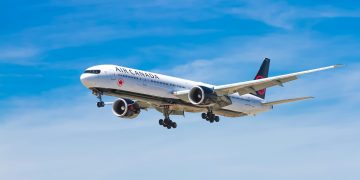Air Canada has decided to cancel orders for converting two Boeing 767-300 passenger jets into freighters, as stated in its first-quarter earnings report. This decision led to a one-time charge of US$14.5 million due to the cancellation of production slots previously reserved at Israel Aircraft Industries.
This change marks another scale-back in growth plans for Air Canada’s fledgling freighter division, which now consists of eight Boeing 767-300 freighters—six converted passenger jets and two factory models. The airline had previously canceled an order with Boeing for two 777-200 production freighters in late September, citing a shift in airfreight demand post-pandemic.
Despite these changes, Air Canada’s management noted that the 18 Boeing 787-10 widebody jets scheduled for delivery starting in late 2025 will offer enhanced cargo capacity, allowing the airline to cater to new demand.
The broader cargo industry has seen similar adjustments, with operators like Canadian airline Cargojet and Miami-based Global Crossing Airlines revising their investment strategies in response to a freight recession that affected the industry until last fall. For instance, Cargojet abandoned plans to acquire and convert eight used Boeing 777s into freighters, and Amerijet returned six newly leased Boeing 757-200 freighters earlier this year.
Despite the challenges, Air Canada reported some positive signs in its cargo operations. The airline’s cargo revenue declined by 9% year-over-year to $156.2 million in the first quarter, showing an improvement compared to a 15% year-over-year drop in the fourth quarter of 2023. The overall cargo revenue for 2023 was down 27% to $682 million, reflecting the gradual recovery in the air cargo market which has grown 11% in the first four months of this year compared to the same period last year.
In comparison to its peers, Air Canada performed better in mitigating the decline in cargo revenue. In North America, American Airlines and Delta Air Lines saw cargo revenues decrease by 15% and 16%, respectively. European carriers like Air France-KLM and Lufthansa reported declines of 16.5% and 17%, respectively. Avianca reported an 8% decrease in cargo revenue year-over-year.
Air Canada stands out from its U.S. counterparts by having dedicated cargo jets in addition to utilizing the cargo capacity in the bellyhold of passenger jets. The carrier also announced the addition of Chicago O’Hare International Airport to its freighter network, with service beginning June 2, operating three times per week to connect Toronto with Chicago.
Overall, Air Canada reported a $60 million loss for the first quarter, with a 7% increase in operating revenue. However, adjusted earnings before interest, taxes, depreciation, and amortization were $329 million, an improvement of $30 million but still below expectations due to rising labor and maintenance costs and decreasing passenger demand.
Get the newest updates in supply chain logistics news on The Supply Chain Report. Visit ADAMftd.com for free international trade tools.
AirCanada #FreighterDivision #Boeing767 #CargoRevenue #AviationNews #AirCargo #AirFreight #AviationIndustry #FleetManagement #CargoOperations #AirlineUpdates #PostPandemicRecovery #ChicagoO’Hare #AviationTrends #AirlineChallenges #Logistics #Aerospace #InvestmentStrategy #CargoMarket #FinancialReport















